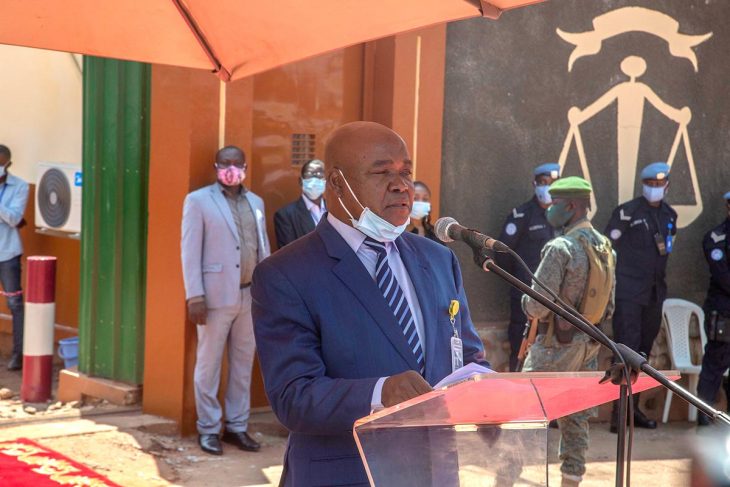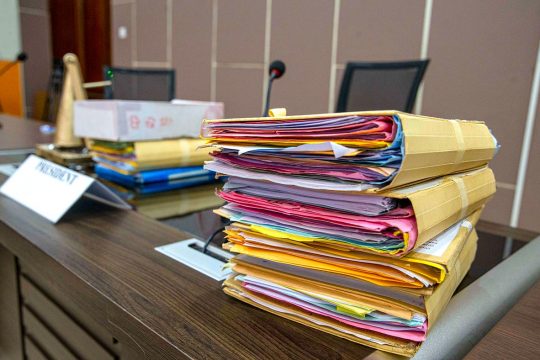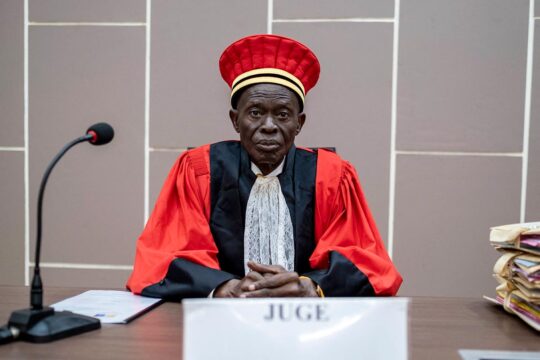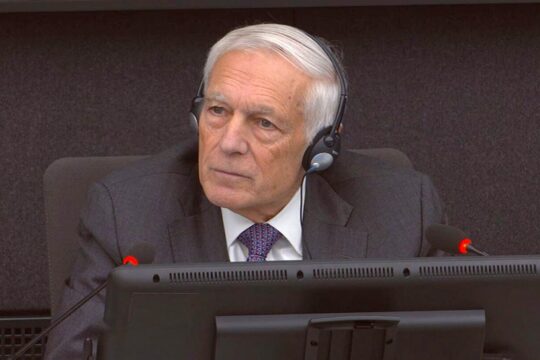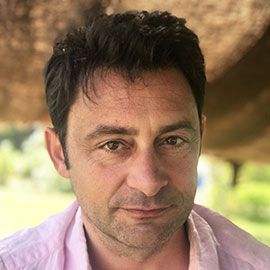"The most advanced case is Fatima," said Deputy Special Prosecutor of the Central African Special Criminal Court (SCC) Alain Ouaby Bekaï, a magistrate who plays a key role in relations with Central African authorities during arrests. In recent months, the UN-backed hybrid court, accused of serious delays since its creation in 2015, has arrested four suspects in the case. They are charged with crimes against humanity and war crimes in relation to the May 28, 2014 attack on the Catholic Church of Our Lady of Fatima, in the third district of Bangui, capital of the Central African Republic.
This episode of violence is carved in people’s memories. Elements of the Seleka rebel movement, acting "apparently in retaliation for the killing of three young Muslims" according to a 2017 United Nations "Mapping" report, threw grenades into the church where thousands of people displaced by the armed conflict had taken refuge, killing 14 people. The trial of the defendants in this case (Hadiatou Gary, Abdel Kader Ali, Al Bachir Oumar and Amadou Yalo) could open in the first quarter of 2023.
The SCC has also made several indictments against anti-Balaka militias that took up arms to oust the Seleka in a civil war that caused the death of at least 3,000 civilians between December 2013 and October 2014, according to the same UN report. The two most recent indictments - for crimes against humanity - concern officers serving in the Central African army, as underlined by members of the court, for acts allegedly committed in Bossembele (northwest of Bangui). They are Vianney Semndiro, indicted in September, and Firmin Junior Danboy, indicted in October. Another former anti-Balaka, Eugène Baret Ngaïkosset (nicknamed the "Butcher of Paoua”), a captain in the presidential guard of former President François Bozizé, was arrested on September 4, 2021. He was first arrested in May 2014 in Bangui and managed to escape. He is now charged by the SCC with war crimes and crimes against humanity.
The second most advanced case to date is that of Ndélé (northeast). According to the public prosecutor's office, this case should go to trial in 2023. Initially, the investigation was opened by the ordinary courts in May 2020, following a massacre committed on April 29, 2020. Twenty-eight people including at least 21 civilians were killed, according to the UN mission in the Central African Republic (MINUSCA), in fighting between two rival factions of the Front populaire pour la renaissance de la Centrafrique (FPRC), one of the main armed groups at the time. According to AFP, fighters of the goula and rounga ethnic groups, previously united in the FPRC, carried out the killings in an effort to control mining deposits and road taxation in the territory.
The SCC, which has primacy over the ordinary national courts, quickly requested that the case be dismissed in its favour. The MINUSCA spokesperson told Justice Info at the time that nine people had been arrested in Ndélé "at the request of the SCC”. Their leader, Azor Kalité, a member of the Goula ethnic group whom Justice Info met in October that year in Camp de Roux prison, is a former member of the Central African Armed Forces (FACA) who joined the Seleka before becoming chief of staff of the FPRC. The identities of the eight other men arrested with him are not public. The number of people still charged in this case was not made known to us. Our sources say there are six. This number includes two arrests in May 2022 in Ndélé during a MINUSCA-coordinated operation with the FACA that went wrong. The targeted suspect, Adam Moctar, was killed under circumstances described in a communiqué from the SCC prosecutor's office. The identities of the two others apprehended have not been made public.
Support from the national gendarmerie
It was after this particular incident that a rapprochement took place with the national gendarmerie. “I had a meeting with the director general of the gendarmerie, to whom I explained the need for the SCC to be supported in the execution of our mandates," Ouaby Bekaï told Justice Info. “It worked very well. The general who heads the gendarmerie received me for a meeting.” It is the SCC special unit of the judicial police, currently composed of 18 people from the Central African police and gendarmerie, which first investigates and locates the suspects. Then the national gendarmerie provides a team of eight agents "ready to intervene as soon as we locate the person”, says Ouaby Bekaï.
"We no longer have to wait for MINUSCA and we don't rely solely on it," says an investigating magistrate with relief. And the results seem to be in. Members of the court told us of at least three additional people arrested (names not all made public) in the last half of 2022, in addition to the six actions mentioned above: ex-Seleka Abdel Kader Kalil in October; a former anti-Balaka leader accused of serious violence against Peulh people in the mining village of Gaga (northwest), also in October; and last but not least "General" Idriss Ibrahim Khalil alias "Bin Laden" in July in Bambari (central CAR).
This arrest is highly symbolic for the SCC, since it is the same case as that of "escaped" minister Hassan Bouba, who is still in government. The two men are being prosecuted, among other things, for their alleged role in a massacre that caused the death of 112 people on November 15, 2018, in Alindao, according to the UN, committed by fighters from the rebel movement to which they belonged, the Union for Peace in Central Africa (UPC), along with other anti-Balaka militias.
"Youthful errors on both sides”
The fact that no one opposed the arrest of this man that has been described as an "accomplice" of Bouba at the time of the alleged crime, as well as the collaboration in recent months of the gendarmerie and the Central African army, allows the president of the court to believe that there is no political blocking (or no longer). “Following this incident, we were received by the head of state," the president of the Court Michel Landry Luanga told Justice Info. “[According to] our exchanges, it was an incident deplored by both sides, youthful errors on both sides. Some thought that a member of the government could not be arrested. We explained the texts of the SCC, which are not those of the national law."
A person from outside the court who wishes to remain anonymous describes a "lack of courtesy" on the part of the SCC, which, before detaining a minister, did not inform the head of government, the minister of justice nor the presidency. In any case, Bouba who is a dissident of the UPC, is probably too useful to the army and its Russian allies for informing about movements of Ali Darass's rebel group, because of the links he has retained within the UPC, this source suggests. This would explain the protection he has enjoyed so far.
“It is an unfortunate incident," Luanga insists. “If he [Bouba] is not in detention, it does not mean that the investigation is not under way. We are serene, we continue to do our work.” And the incident even produced some positive effects, according to the Court president. "We had issued warrants, but for a long time nothing moved,” he says. “After the Bouba incident, we took the opportunity to execute our mandates. We received a firm promise. Instructions were given. That's what led to the latest arrests.”
Luanga rejects the idea that both government and MINUSCA are trying to limit the number and level of responsibility of those arrested out of political expediency. "You can't conclude from one incident that the court is weakened and that it can't take on the authorities," he says.
Obo: “We had no choice”
Collaboration with the ordinary courts has also improved, according to the Court president. "We had problems, a tug-of-war, but today when we ask for a file we get it, he told Justice Info." He points to the case of an attack in 2020 on the town of Obo, in the southeast of the country. Nine individuals were arrested and presented as members of the UPC. At that time, when contacted by Justice Info, the UPC said they were shopkeepers, shepherds, artisans and motorcycle cab drivers. It is now half understood that this was probably the case.
“Obo was the choice of the Bangui public prosecutor's office, we had no choice," Luanga continues, before adding that, more generally, the SCC may have received "insufficient files”. He says the court has not had any cases dismissed, although there have been provisional releases in cases where the person could not be charged such as in the Obo case.
Distribution of cases between courts
How is the distribution of cases decided between all the courts seized of the gravest crimes in the Central African Republic? "We all go fishing, and there are many fish to catch. If we see a fish that interests us, it is left to us," Luanga answers with a smile. And with the ICC? "We received the new officials," he said shortly after the ICC President visited Bangui at the end of November and shortly before the announcement by Prosecutor Karim Khan that he was closing his investigations in the Central African Republic. "We felt a pragmatism on their part, a willingness to cooperate and to give priority to the SCC in the Central African Republic instead of overburdening the ICC. This is a sign of confidence, it reflects the recognition of the work done, and it can lighten their load."
There is still a lot of progress to be made, says one investigating magistrate, who describes "enormous potential for collaboration with the ICC, but almost nothing in practice”. The SCC's investigating offices consult the ICC's online decisions and request documents. Two rogatory letters were sent in October 2021, which were still unanswered in early December 2022. A third, more recent request has been made. Things are changing, however, according to the court president, who said the judges that went to The Hague in early December for meetings on the sidelines of the ICC Assembly of States Parties "came back with the information they wanted”.
The fact remains that if the ICC discharges itself from the Central African Republic, there is a real risk of overburdening the SCC. To date, the SCC has only one trial chamber, which at best can only try two cases per year. According to our information, the 20 or so investigators of the judicial police unit are already overloaded with no less than 19 ongoing investigations, three preliminary inquiries (including one concerning the French company Castel, which required numerous hearings), 12 files under analysis and at least 20 direct complaints from victims, which do not go through the public prosecutor. Past years have shown that the SCC cannot make rapid recruitments. Its personnel are recruited through the United Nations system and, in the case of high-level international positions (including magistrates), must be supported (paid for) by the countries of origin of the persons concerned.
"The black spot is resources”
The long-standing issue of the Court's management autonomy from its UN partners, who have managed its funds and human resources from the beginning, still needs to be resolved. The key man here is the deputy registrar, who, according to the regulations, "shall be responsible for the management of financial services”. This internationally seconded position could not be filled for years. It is now occupied by a German of Cameroonian origin, Ousman Njikam, who arrived in Bangui in September, who has a personality and profile considered reassuring, as he has worked in the registries of several international courts.
We asked him about the autonomy of the Court. "That is always the goal,” he says. “Is that where we are now? No," he answers. It needs to create a management structure, he says, and "we need to think carefully before we act”. In the meantime, he has a number of other priorities, two of which seem more urgent than the others: setting up an internal computer system, which does not yet exist; and equipping the courtroom with sound and cameras in preparation for the trials.
"The black spot is resources," admits Njikam, who has started to approach donors. Out of its 14 million Euro operating budget, the SCC received only half of it in 2022, mainly from MINUSCA and the United States. The European Union, because of the presence of the Russian private security company Wagner in the Central African Republic, had partially frozen its budget support. “Financial means are a real problem," Luanga admits. “If not for the convincing results, they [the donors] would probably have given up. The big concern now is whether the Court's partners will renew their trust in 2023. But the biggest expenses like building the Court have been made. It shouldn't be that difficult."
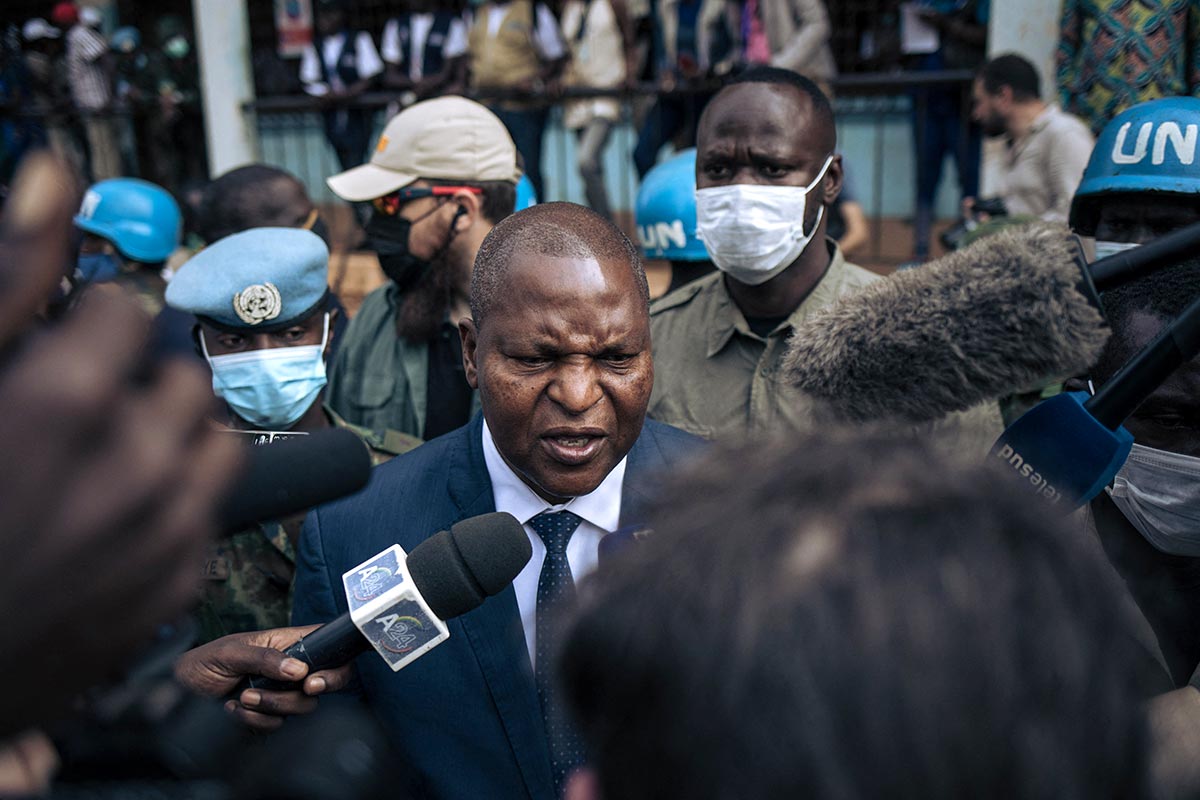
A Rwandan woman “moving the goalposts”
"They want to get married with the Russians, but they are asking the West to pay for the wedding," says a person close to the Court about the Central African government, who is much less optimistic about the future of its finances. In recent months, the politico-judicial context in the Central African Republic has been marked by a shake-up in the judiciary, with the departure of some 20 of the most senior judges including the president of the Constitutional Court, Danielle Darlan. The opposition accuses the head of state of wanting to change the fundamental law to run for a third term.
Nevertheless, the SCC appears to be serving a useful purpose for President Touadera. He formally gave his political endorsement to the renewal of the court's mandate following a November 21 meeting with Valentine Rugwabiza, a Rwandan diplomat and businesswoman who arrived in Bangui in April 2022 with the dual role of Special Representative of the UN Secretary-General and head of MINUSCA. "Many things have changed since the arrival of the representative, the goalposts have moved," said Luanga.
The Rwandans, other major allies of the government, are increasingly extending their influence in the country, and not only in the field of security. Will Rwanda's soft power move the lines, including in the area of justice? It remains that with the renewal of the SCC's mandate, Touadera should at least reaffirm the statements on justice that he has made since the beginning of his first term in 2016.
“The SCC is in agreement with the government's discourse on the fight against impunity," said the court president. “There was [the peace agreement in] Khartoum [in 2019]. Some time ago, 80% of the country was in the hands of the rebels, uncontrolled. This is no longer the case. Before, it was not possible to arrest people in PK5 [Bangui's third district, with a Muslim majority]. We did it recently. Everything is linked to peace and security. If there is effectiveness [of the SCC], it is when peace has returned. If there are still difficulties, it is because peace is not fully there. If you believe the word of the authorities it is that they are making efforts to bring peace, and that we become a post-conflict jurisdiction."


